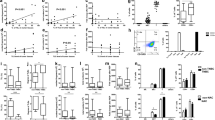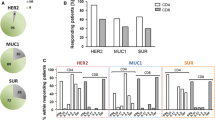Abstract
Cell-mediated immune (CMI) responses to tumor-associated antigens (TAA) in the early postoperative period were examined for correlations with disease recurrence and survival in a 13-year-prospective study of 77 stage 1 and 2 breast cancer patients treated with modified radical or radical mastectomy alone. Among the 21 patients who had positive lymphoproliferative tests using patients' peripheral blood mononuclear cells and autologous TAA of breast cancer cells, only one died from metastatic disease (5%). Among the 56 patients who had a negative test, 23 died from metastatic disease (41%). This difference is statistically significant (p = 0.002) Three other risk factors including tumor size, nodal status and cell differentiation patterns were also analyzed. When these three clinical-pathologic criteria were analyzed individually, none reliably predicted disease recurrence and survival. Nodal status was the most predictive clinical-pathologic risk factor, but was not significant (p = 0.089). The results of this study demonstrate the detection of CMI responses against autologous TAA by lymphoproliferative assays identifies a sub-set of stage 1 and 2 breast cancer patients who are at minimal risk of developing metastatic disease. This testing also identifies immunologically unreactive patients who are at risk for disease recurrence.
Similar content being viewed by others
References
McGuire WL, Clark GM. Fisher ER, Henderson IC: Predicting recurrence and survival in breast cancer. Breast Cancer Res Treat 9(1): 27–38, 1987
Fisher B, Slack NH, Bross ID: Cancer of the breast: size of neoplasm and prognosis. Cancer 24(5): 1071–1080, 1969
Harbeck N, Dettmar P, Thomssen C, Henselmann B, Kuhn W, Ulm K, Janicke F, Holfer H, Graeff H, Schmitt M: Prognostic impact of tumor biological factors on survival in node-negative breast cancer. Anticancer Res 18: 2187–2198, 1998
Fisher B, Bauer M, Wickerham DL, Redmond CK, Fisher ER, Cruz AB, Foster R, Gardner B: Relation of number of positive axillary nodes to the prognosis of patients with primary breast cancer. Cancer 52: 1551–1557, 1983
Black MM, Opler SR, Speer FD: Survival in breast cancer cases relative to the structure of the primary tumor and regional lymph nodes. Surg Gynecol Obstet 100: 543–551, 1955
Fisher ER. Redmond C, Fisher B: Histologic grading of breast cancer. Path Ann 15(Pt. 1): 239–251, 1980
Shiao YH, Chen VW, Lehmann HP, Wu XC, Cirrea P: Patterns of DNA ploidy and S-phase fraction associated with breast cancer survival in blacks and whites. Clin Canc Res 3: 587–592, 1997
McGuire WL, Dressler LG: Emerging impact of flow cytometry in predicting recurrence and survival in breast cancer patients. J Natl Cancer Inst 75: 405–410, 1985
Raemaekers JM, Beex LV, Koenders AJ, Pieters GF, Smals AG, Benraad TJ, Kloppenborg PW: Disease-free interval and estrogen receptor activity in tumor-tissue of patients with primary breast cancer: analysis after long-term followup. Breast Cancer Res Treat 6: 123–130, 1985
Thorpe SM, Rose C, Rasmussen BB, Mouridsen HT, Bayer T, Keiding N: Prognostic value of steriod hormone receptors: multivariate analysis of systemically untreated patients with node negative primary breast cancer. Canc Res 47: 6126–6133, 1987
Head JF, Elliott RL, McCoy JL: Evaluation of lymphocyte immunity in breast cancer patients. Breast Cancer Res Treat 26: 77–88, 1993
Bisterfeld S, Kluppel D, Koch R, Schneider S, Steinhagen G, Mihalcea AM, Schroder W: Rapid and prognostically valid quantification of immunohistochemical reactions by immunohistochemistry of the most positive tumor focus. A prospective follow-up study on breast cancer using antibodies against MIB-1. PCNA, ER, and PR. J Path 185: 25–31, 1998
Watkins SM: Cancer prognosis predicted by preoperative lymphocyte responsiveness in vitro. Br J Surg 63: 433–434, 1976
Mandeville R, Lamoureux G, Legault-Poisson S, Poisson R: Biological markers and breast cancer. A multiparametric study II. Depressed immune competence. Cancer 50(7): 1280–1288, 1982
Burford-Mason A, Gyte GM, Watkins SM: Phytohemagglutinin responsiveness of peripheral lymphocytes and survival in patients with primary breast cancer. Breast Cancer Res Treat 13(3): 243–250, 1989
Wiltschke C, Krainer M, Budinsky AC, Berger A, Muller C, Zellinger R, Speiser P, Kubista E, Eibl M, Zielinski CC: Reduced mitogenic stimulation of peripheral blood mononuclear cells as a prognostic parameter for thc course of breast cancer: a prospective longitudinal study. Br J Canc 71(6): 1292–1296, 1995
Kiang DT, Greenberg LJ, Dennedy BJ: Tumor marker kinetics in the monitoring of breast cancer. Cancer 65(2): 193–199, 1990
Hayes DF: Tumor markers for breast cancer. Current utilities and future prospects. Haemat Onc Clin N Am 8(3): 485–506, 1994
Ballesta AM, Molina R, Filella X. Gimenez N: Carcinoembryonic antigen and staging and follow-up of patients with solid tumors. Tumor Bio 16(1): 32–41, 1995
Chan DW, Beveridge RA, Muss H, Fritsche HA, Hortobagyi G, Theriault R, Kiang D, Kennedy BJ, Evelegh M: Use of truquant BR radioimmunoassay for early detection of breast cancer recurrence in patients with stage II and stage III disease. J Clin Onc 15(6): 2322–2328, 1997
Press MF, Bernstein L, Thomas PA, Meisner LF, Zhou JY, Ma Y, Hung G, Robinson RA, Harris C, El-Naggar A, Slamon DJ, Phillips RN, Ross JS, Wolman SR, Flom KJ: HER-2/neu gene amplification characterized by fluorescence in situ hybridization: Poor prognosis in node-negative breast carcinomas. J Clin Onc 15(8): 2894–2904, 1997
Ross JS, Fletcher JA: The HER-2/neu oncogene in breast cancer: prognostic factor, predictive factor, and target for therapy. Stem Cells 16: 413–428, 1998
Christianson TA, Doherty JK, Lin YJ Ramsey EE, Holmes R, Keenan EJ, Clinton GM: NH2-terminally truncated HER-2/neu protein: relationship with shedding of the extracellular domain and with prognostic factors in breast cancer. Canc Res 58: 5123–5129, 1998
Hellman S, Harris JR: The appropriate breast cancer paradigm. Canc Res 47: 339–342, 1987
Anonymous: Effects of adjuvant tamoxifen and cytotoxic therapy on mortality in early breast cancer. An overview of 61 randomized trials among 28, 896 women. Early Breast Cancer Trialists' Collaborative Group. New Eng J Med 319: 1681–1692, 1988
Fisher B, Dignam J, Wolmark N, DeCillis A, Emir B, Wickerham DL, Bryant J, Dimitrov NV, Abramson N, Atkins JN, Shibata H, Deschenes L, Margolese RG: Tamoxifen and chemotherapy for lymph node-negative, estrogen receptorpositive breast cancer. J Natl Canc Inst 89(22): 1673–1682, 1997
Oncology News International 8: 2-3, 1999
Tallman MS, Gray R, Bennett JM, Variakojis D, Robert N, Wood WC, Rowe JM, Wiernik PH: Leukemogenic potential of adjuvant chemotherapy for early-stage breast cancer: the eastern cooperative oncology group experience. Class Pap & Curr Comm 1(1): 444–451, 1996
Dean JH, McCoy JL, Cannon GB, Leonard CM, Perlin E, Kreutner A, Herbermann RB: Cell-mediated immune responses of breast cancer patients to autologous tumorassociated antigens. J Natl Canc Inst 68: 549–555, 1977
Oren ME, Herbermann RB: Delayed cutaneous hypersensitivity reactions to membrane extracts of human tumors. Clin Exp Immunol 9: 45–56, 1971
Iacopetta B, Grieu F, Powell B, Soong R, McCaul K, Seshadri R: Analysis of p53 gene mutation by polymerase chain reaction-single strand conformation polymorphism provides independent prognostic information in node-negative breast cancer. Clin Canc Res 4: 1597–1602, 1998
Author information
Authors and Affiliations
Rights and permissions
About this article
Cite this article
McCoy, J.L., Rucker, R. & Petros, J.A. Cell-mediated immunity to tumor-associated antigens is a better predictor of survival in early stage breast cancer than stage, grade or lymph node status. Breast Cancer Res Treat 60, 227–234 (2000). https://doi.org/10.1023/A:1006405504158
Issue Date:
DOI: https://doi.org/10.1023/A:1006405504158




